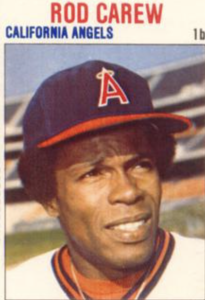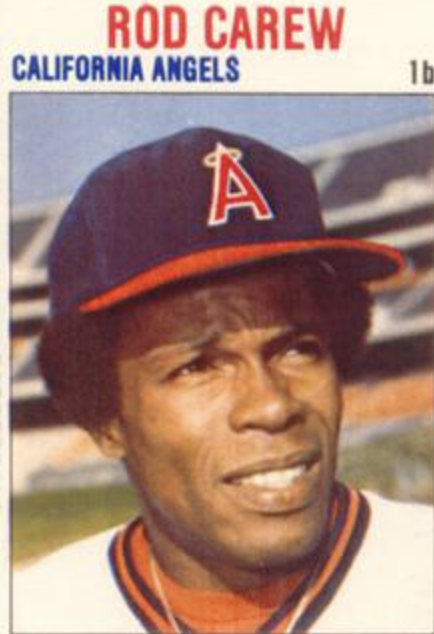April 17, 1979: Rod Carew returns to Minnesota as a visiting Angel
 Signed as an 18-year-old amateur free agent by the Twins in 1964, Rod Carew became the Twins’ second baseman in 1967 and was named Rookie of Year and an American League All-Star. He won seven batting titles as a Twin from 1969 through 1978, and in 1977, when he flirted with the .400 mark and finished at .388, was named the American League’s Most Valuable Player and appeared on the cover of Time.
Signed as an 18-year-old amateur free agent by the Twins in 1964, Rod Carew became the Twins’ second baseman in 1967 and was named Rookie of Year and an American League All-Star. He won seven batting titles as a Twin from 1969 through 1978, and in 1977, when he flirted with the .400 mark and finished at .388, was named the American League’s Most Valuable Player and appeared on the cover of Time.
All of which explains why his initial appearance at Metropolitan Stadium as a visiting player, in the Twins’ home opener of April 17, 1979, turned into a Rodney-fest. A Rod Carew Day was declared by the Minnesota State Senate, and he was the subject of photos, headlines, and sports columns in the Minneapolis Tribune, Minneapolis Star, St. Paul Dispatch, and St. Paul Pioneer Press.
The Twins’ all-time (well, 19 seasons) attendance record for a home opener had been set in 1961, their first season in town, at 24,606. By April 17, 14,000 tickets had been sold for Carew’s return, with hopes, given that the Twins had won seven of their first nine and that the temperature was expected to exceed the average high of around 50 degrees (“I hope it doesn’t rain,” said Twins’ owner-general manager Calvin Griffith).1 Yielding to unbridled optimism, Twins ticket manager Dave Moore told the Tribune’s Tom Briere that that all-time record for the home opener might be threatened.2
The sun shone brilliantly. The mercury hit 67 degrees. And 37,529 attended, obliterating the old record. It was not matched in the two seasons remaining at the Met. Would it have happened without Carew’s departure and return? The Tribune, at least, gave him the largest share of the credit.3
Carew, of course, should have followed up, especially since he reacted to his overwhelmingly friendly reception by greeting fans and signing autographs on the sidelines before the game, by playing a key role in a close, exciting contest, but no … another future Hall of Famer, Nolan Ryan, scattered four hits and three walks and struck out 10 for his second dominant win against the Twins within a week. Twins starter Dave Goltz yielded the eventual winning run in the first on Rick Miller’s leadoff triple and Don Baylor’s two-out single, and was knocked out during the Angels’ four-run fifth. Willie Mays Aikens led off the inning with a solo home run, followed by back-to-back triples by Brian Downing and Bobby Grich, a sacrifice fly by Rance Mulliniks, and a single by Miller, which turned into a run when center fielder Willie Norwood let the ball go through his legs, allowing Miller to complete a circuit of the bases. A single run in the seventh, off Pete Redfern when Grich doubled and later scored on another sacrifice fly by Mulliniks, closed the scoring.
Carew settled for a single in four at-bats. Interviewed extensively after the game, he radiated contentment, following up his comment on arrival the previous day that it was “nice to get away from Calvin”4 by expressing his pleasure with his reception by the fans, which included a standing ovation during pregame player introductions, and with the talent he now found himself surrounded by on the Angels; he wished the Twins well.
Carew’s reception was part and parcel of the increasingly unsettled environment in which Griffith and the Twins were trying to find a way forward, a stew of Griffith’s financial limitations (self-imposed, to an extent), the beginning of player free agency in 1976, and the local campaign to move the club to an indoor ballpark in downtown Minneapolis designed to be shared with the National Football League’s Minnesota Vikings. At 67, Griffith ultimately couldn’t or wouldn’t adjust successfully. He sold his controlling interest in the club to Twin Cities banking magnate Carl Pohlad in 1984, less than three seasons after the Twins moved downtown and indoors to the Hubert H. Humphrey Metrodome.
The contrast between the joys of watching baseball on the warmest day in six months in the Twin Cities and the prospect of indoor baseball on such days were not lost on the pundits and fans present on April 17. “I won’t go to any baseball game in a stadium with a dome,” one fan was quoted as promising.5 The Tribune’s Bob Lundegaard, after emphasizing the glorious weather, reminded his readers that Metropolitan Stadium was “undomed,” and the paper accompanied his lead article with a photo of bare-chested fans soaking up the sun.6 Lundegaard’s fellow on the Tribune, M. Howard Gelfand, was more explicit: “It was such a perfect day that only advocates of a domed stadium could have found misery under the cloudless sky. Now a stadium was something to play ball in, not to put a roof over.”7
Depressing both the fan base and the Twins’ prospects of building another winner on the field more immediately was professional baseball’s altered labor-relations landscape – player free agency – which had revolutionized player compensation, converting the Griffith-family-owned operation, which was completely dependent on the Twins, from an outmoded outlier in a landscape of independently wealthy major-league club owners to a financial dinosaur staring extinction in the face. Calvin Griffith had long been a bitter resister of changes in players’ status and was notorious as a tough negotiator of player salaries. His early years in Minnesota, when he could maintain a competitive payroll level, had departed and would not return while his remained a family-operated franchise dependent on its baseball income and operating in a comparatively small market lacking a major-league tradition of long standing. Since 1976, when his stars could begin contemplating free agency, future Hall of Famers Carew and Bert Blyleven, middle-of-the order regular Larry Hisle, and young star Lyman Bostock had departed, either by free agency or by trades engineered to prevent their loss without compensation.
Fans and the local press reacted predictably to the departures and the unpromising outlook under the Griffith ownership, as typified by comments published on the occasion of Carew’s return with the Angels on April 17. Acerbic St. Paul Pioneer Press columnist Don Riley presented a laundry list of blameworthys that fans could choose to “hate”: The California Angels, for signing Carew; Carew, for leaving; the Twins and/or Griffith, for letting him go; Gene Autry, the Angels’ owner, for throwing outrageous sums at Carew and others; greedy players in general; and the whole system, where loyalty to fans and teams was now taking a back seat.8 Most other commentaries took sides: While Carew was the object of a prolonged standing ovation at the beginning of game (which he explained by noting that “the people here know I gave them 12 years of good baseball”9), Charley Walters of the Pioneer Press led off his article with a reference to “Millionaire Rod Carew”10; a fan wrote to the Minneapolis Star to complain, “Rod Carew sold out to the California team last winter. … [H]ow come the constant, everyday pictures and stories?”11 a “Carew the Capitalist” banner appeared in the left-field pavilion;12 and the applause for Carew faded away by his last plate appearance. Others were differently inclined: “Trade Calvin Griffith” buttons appeared on fans tailgating in the stadium parking lot;13 “Cal Griffith Fan Club” was inscribed on bags that a few wags wore over their heads;14 a fan was quoted as observing that “It’s Griffith who should be traded”;15 and Lundegaard reported, “Minnesota governor Al Quie threw out the first ball. … ‘If that picture of him next to Calvin gets in the paper,’ muttered a nearby fan, ‘it’ll cost him 30,000 votes.’”16
As Griffith mostly remained in his box during the April 17 game, anti-Calvinists refocused on a striking symbol of the changes in the Twins’ fortunes: young outfielder Willie Norwood, who followed up on his team-record 14 errors in 1978 by letting a groundball single go through his legs, to the accompaniment of raucous jeers. Naturally, Norwood led off the home half of the same inning, singled, and was promptly picked off first base, with departed hero Carew applying the tag.
The Minneapolis Tribune’s sports-section headline of April 18 appeared to capture the day’s essence: “Perfect baseball day has flaws.”17
Notes
1 Charley Walters, “Carew an Opponent for Twins’ Opener,” St. Paul Pioneer Press, April 17, 1979: 14.
2 Tom Briere, “Carew Comes Home Carrying Enemy Colors,” Minneapolis Tribune, April 17, 1979: 1C.
3 Bob Lundegaard, “Calvin Has Full House, but Twins Lose,” Minneapolis Tribune, April 18, 1979: 1A.
4 Walters, “Carew an Opponent for Twins’ Opener.”
5 Sean T. Kelly, “Baseball Buffs Abound at Record Twins Opener,” St. Paul Dispatch, April 18, 1979: 1.
6 Lundegaard, “Calvin Has Full House, but Twins Lose,” Minneapolis Tribune, April 18, 1979: 1A.
7 M. Howard Gelfand, “Perfect Baseball Day Has Flaws,” Minneapolis Tribune, April 18, 1979: 1C.
8 Don Riley, “Don Riley’s Eye Opener,” St. Paul Pioneer Press, April 17, 1979: 14.
9 Joe Soucheray, “Joe Soucheray,”, Minneapolis Tribune, April 18, 1979: 1C.
10 Walters, “Carew an Opponent for Twins’ Opener.”
11 “Fan Opinion,” Minneapolis Star, April 17, 1979: 8C.
12 Charley Walters, “Rod Good Hitter, Poor Guesser,” St. Paul Pioneer Press, April 18, 1979: 17.
13 Kelly, “Baseball Buffs Abound at Record Twins Opener.”
14 Paul Levy, “Baseball Fans Special, and So’s Opening Day,” Minneapolis Star, April 18, 1979: 9B.
15 Kelly, Kelly, “Baseball Buffs Abound at Record Twins Opener.”
16 Lundegaard, “Calvin Has Full House, but Twins Lose.”
17 Gelfand, “Perfect Baseball Day Has Flaws.”
Additional Stats
California Angels 6
Minnesota Twins 0
Metropolitan Stadium
Bloomington, MN
Box Score + PBP:
Corrections? Additions?
If you can help us improve this game story, contact us.


